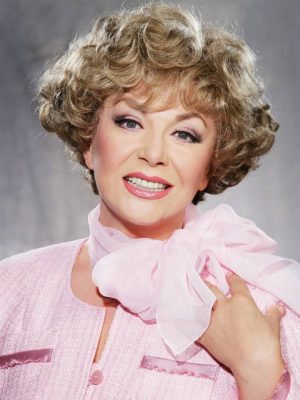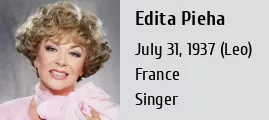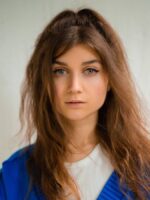Edita Pieha
Height, Weight, Size, Body Measurements, Biography, Wiki, Age

When and where Edita Pieha was born?
| Age |
|---|
| 88 years |
| Birth date |
| July 31, 1937 |
| Zodiac sign |
| Leo |
| Place of Birth |
| France |
| Occupation |
| Singer |
| Log in and Edit |
Biography (wiki)

Edita Piekha (Russian: Эди́та Станисла́вовна Пье́ха, Edita Stanislavovna Pyekha, Polish: Edyta Piecha, French: Édith-Marie Pierha) is a Russian singer and actress of Polish descent. She was the third popular female singer, after Klavdiya Shulzhenko and Sofia Rotaru, to be named a People’s Artist of the USSR (1988).
Edita Piekha is a well known public activist for humanitarian causes, and is a supporter of orphanages in Russia.
Edita Piekha was born in Noyelles-sous-Lens, France, in 1937, into an ethnic Polish family. Her father was Stanisław Piecha, a mining worker, and her mother was Felicja Korolewska. From 1945 to 1955 Edita Piekha lived in Boguszów, Poland with her mother and stepfather. There she studied music, sang with a choir, and excelled in Russian at her school, graduating at the top of her class.
In 1955, Edita Piekha moved to Leningrad to study psychology on a state scholarship. From 1955 to 1957 she attended A. A. Zhdanov Leningrad State University (now known as Saint Petersburg State University). There she met composer and pianist Aleksandr Bronevitsky. Together they formed the first popular band in Russia, named Druzhba, and gave their first TV performance on New Year’s Eve, 31 December 1955, with the Polish song «Autobus czerwony» which became a popular hit in the USSR.
Body Measurements
Height and Weight 2026

| Height | 5 ft 9 in / 174 cm |
|---|---|
| Weight | 143 lb / 65 kg |
| Log in and Edit |
Body size

| Breast/Bust size | 33 in / 86 cm |
|---|---|
| Waist size | 25 in / 64 cm |
| Hips size | 35 in / 91 cm |
| Bra size | 38B (US) / 85B (EU) |
| Cup size | B (US) |
| Dress Size | – |
| Shoe (Feet) Size | – |
| Log in and Edit |

Appearance
| Hair Color | Blonde |
|---|---|
| Eye Color | Blue |
| Nationality | Russian |
| Race / ethnicity | White |
Video
Similar celebrities
Who has a birthday today »
Eurovision 2024 – contestants »










